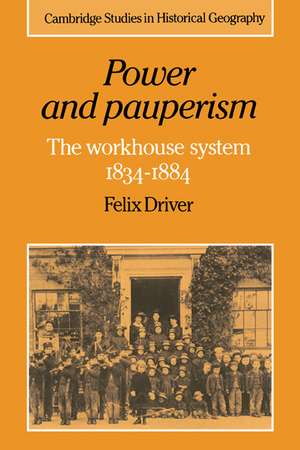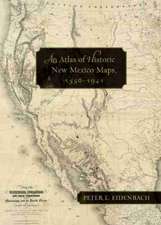Power and Pauperism: The Workhouse System, 1834–1884: Cambridge Studies in Historical Geography, cartea 19
Autor Felix Driveren Limba Engleză Paperback – 25 aug 2004
Din seria Cambridge Studies in Historical Geography
-
 Preț: 273.22 lei
Preț: 273.22 lei -
 Preț: 244.49 lei
Preț: 244.49 lei -
 Preț: 355.39 lei
Preț: 355.39 lei -
 Preț: 338.70 lei
Preț: 338.70 lei -
 Preț: 323.05 lei
Preț: 323.05 lei -
 Preț: 305.12 lei
Preț: 305.12 lei -
 Preț: 286.13 lei
Preț: 286.13 lei -
 Preț: 282.48 lei
Preț: 282.48 lei -
 Preț: 289.19 lei
Preț: 289.19 lei -
 Preț: 407.47 lei
Preț: 407.47 lei -
 Preț: 280.53 lei
Preț: 280.53 lei -
 Preț: 454.76 lei
Preț: 454.76 lei -
 Preț: 404.43 lei
Preț: 404.43 lei -
 Preț: 464.60 lei
Preț: 464.60 lei -
 Preț: 436.68 lei
Preț: 436.68 lei -
 Preț: 405.07 lei
Preț: 405.07 lei -
 Preț: 324.15 lei
Preț: 324.15 lei -
 Preț: 317.29 lei
Preț: 317.29 lei -
 Preț: 406.33 lei
Preț: 406.33 lei - 5%
 Preț: 405.43 lei
Preț: 405.43 lei -
 Preț: 288.11 lei
Preț: 288.11 lei -
 Preț: 387.35 lei
Preț: 387.35 lei -
 Preț: 321.52 lei
Preț: 321.52 lei -
 Preț: 189.72 lei
Preț: 189.72 lei -
 Preț: 349.62 lei
Preț: 349.62 lei -
 Preț: 434.01 lei
Preț: 434.01 lei -
 Preț: 316.90 lei
Preț: 316.90 lei -
 Preț: 452.26 lei
Preț: 452.26 lei -
 Preț: 401.28 lei
Preț: 401.28 lei -
 Preț: 338.33 lei
Preț: 338.33 lei
Preț: 340.33 lei
Nou
Puncte Express: 510
Preț estimativ în valută:
65.13€ • 68.48$ • 53.81£
65.13€ • 68.48$ • 53.81£
Carte tipărită la comandă
Livrare economică 17 aprilie-01 mai
Preluare comenzi: 021 569.72.76
Specificații
ISBN-13: 9780521607476
ISBN-10: 0521607477
Pagini: 224
Ilustrații: 1
Dimensiuni: 152 x 229 x 13 mm
Greutate: 0.34 kg
Ediția:Pbk.
Editura: Cambridge University Press
Colecția Cambridge University Press
Seria Cambridge Studies in Historical Geography
Locul publicării:Cambridge, United Kingdom
ISBN-10: 0521607477
Pagini: 224
Ilustrații: 1
Dimensiuni: 152 x 229 x 13 mm
Greutate: 0.34 kg
Ediția:Pbk.
Editura: Cambridge University Press
Colecția Cambridge University Press
Seria Cambridge Studies in Historical Geography
Locul publicării:Cambridge, United Kingdom
Cuprins
List of figures; List of tables; Acknowledgements; Abbreviations; Introduction; 1. Policing society: government, discipline and social policy; 2. Social policy, liberalism and the mid-Victorian state; 3. Rational landscapes? the geography of Poor Law government; 4. Designing the workhouse system, 1834–1884; 5. Building the workhouse system, 1834–1884; 6. Classifying the poor: maps of pauper-land; 7. The politics of territory: the anti-Poor Law movement; 8. From township to Union? the geography of Poor Law administration at a local level; 9. The workhouse system from a local perspective; Conclusion; Notes; Bibliography; Index.
Descriere
A new perspective on the place of the workhouse in the history and geography of nineteenth-century society and social policy.









